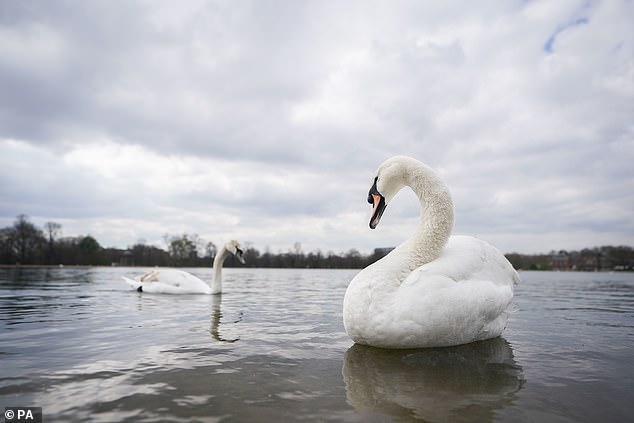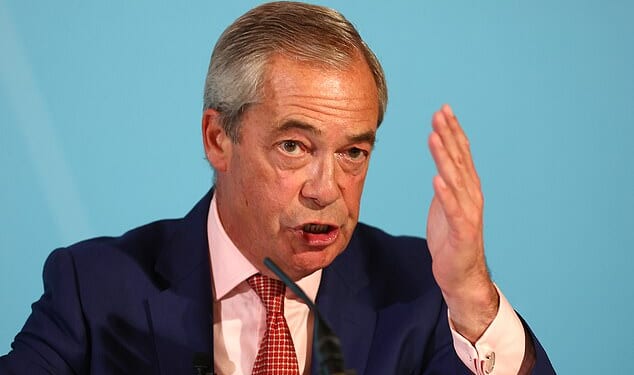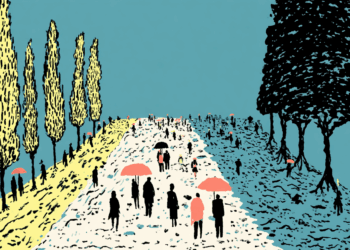The Left-wing media has spent much of this week gleefully ‘debunking’ Nigel Farage’s claim that Eastern European migrants have eaten swans taken from the Royal Parks.
The leader of Reform UK made the allegation on Nick Ferrari’s LBC breakfast show on Wednesday after being asked about Donald Trump’s claim during last year’s US presidential election campaign that Haitian immigrants in Ohio had been eating pet cats and dogs.
Farage’s exact words were: ‘If I said to you that swans were being eaten in Royal Parks in this country, that carp were being taken out of ponds and eaten in this country by people who come [from other cultures] would you agree it happened… is happening here?’
The custodians of the Royal Parks swiftly responded that they had had no reports of any such incidents. This was immediately pounced on by the likes of Jon Sopel and Emily Maitlis, those personifications of the ivory tower chattering classes, and it wasn’t long before Farage was being accused of ‘fowl play’.
But have his detractors been too hasty in rushing to judgment? The truth is that, if he had resisted the urge to include the rhetorical flourish of ‘Royal Parks’, Farage’s assertion might not have been dismissed so easily.
For there is, in fact, a substantial body of anecdotal evidence that a small minority of migrants may indeed have been capturing, killing and eating swans from British rivers, ponds and lakes.
One of the most convincing episodes relates to an RSPCA investigation of a family that was suspected of stealing a swan from a local park in 2010.

The truth is that, if he had resisted the urge to include the rhetorical flourish of ‘Royal Parks’, Farage’s assertion might not have been dismissed so easily

The Guardian reported in 2003, just as mass migration from the EU was beginning to increase, that at least 100 swans had gone missing from stretches of water in East London
Sky One’s Emergency Animal Rescue programme filmed the welfare officer visiting the Romanian family at their home, where she discovered the meat and bones of an unknown bird simmering in a cooking pot.
As the officer inspects the contents of the casserole pot, she says: ‘You see the bones in this bird, because it’s not a chicken… I’m a bit concerned.’
The footage also shows the officer retrieving white feathers and a distinctly swan-like beak from a bin in the back garden.
The clip was recently reposted on social media by, among others, Turning Point UK, a British offshoot of the Right-wing American student pressure group run by the recently assassinated Charlie Kirk, where it has been viewed hundreds of thousands of times.
Two years later, the Evening Standard reported that an angler on London’s River Lea came across a man – whose accent suggested he was an Eastern European immigrant – in a makeshift tent cooking his evening meal surrounded by the bodies of slaughtered swans.
One of the earliest reports about swans disappearing appeared in, of all places, The Guardian newspaper, that favourite of paid-up members of the metropolitan elite.
It reported in 2003, just as mass migration from the EU was beginning to increase, that at least 100 swans had gone missing from stretches of water in East London, including the River Lea.
A ‘strong line of inquiry’ was that they had been stolen for food, according to Scotland Yard.
Ten years later it was clear that the problem had not gone away, with the prestigious Time magazine running a piece under the headline: ‘Someone is kidnapping and eating Britain’s swans.’

People from societies where rivers and forests are hunting grounds to this day may well find concepts such as conservation entirely alien, says Tom Harwood
The incidents in question occurred at Lincoln’s iconic Brayford Pool, where the city’s swans have nested for centuries.
Time’s colourful dispatch revealed: ‘Witnesses told investigating officers that they saw a team of five men attacking one of the snowy white birds with a nail-studded implement.’
In the succeeding days, a further three carcasses were recovered.
It’s possible, of course, that the native inhabitants of Lincoln spontaneously developed a taste for such cuisine – although it seems more likely that the changing demographics of the city, which saw an influx of migrants from the EU’s new Eastern European members, may help to explain what happened.
Seven months after that outbreak of swan-related violence, there was an even more graphic story in London’s Evening Standard newspaper.
‘Queen’s swan “killed, barbecued, eaten and dumped on riverbank”,’ blared the headline.
‘It was just a carcass, it was all burnt,’ Wendy Hermon, 46, of the charity Swan Lifeline was quoted as saying. ‘We could see that whoever did this had taken the breast out. It was done neatly, presumably to get at the meat.
‘They had skinned it as well and possibly barbecued it there, on a disposable barbecue.’ When the Covid pandemic struck in 2020 – and many people found themselves in straitened circumstances – there was a spike in the number of similar incidents.
Attacks on swans, ducks and geese, with a range of weapons ranging from air guns to fireworks, soared by 59 per cent, according to The Times.
Now, I’m not for one moment suggesting that dozens of these majestic beasts are being snatched from British lakes and rivers on a daily basis. And it is true that many reports make no reference to the nationalities of offenders due to a lack of eyewitnesses.
But for Nigel Farage’s detractors to pretend that no migrants have ever engaged in poaching of wildfowl or fish is, at the very least, presumptuous.
People from societies where rivers and forests are hunting grounds to this day may well find concepts such as conservation, with all its attendant rules and regulations, entirely alien.
When it comes to fishing for freshwater carp, for example, there are often ‘catch and release’ regulations in force here to ensure the sustainability of the fish population. But migrants from countries where no such protection rules exist may not be aware of such restrictions, as the editor of Angling Times pointed out after there were a number of reports of individuals failing to release fish in 2012.
‘The problem has arisen because a lot of Eastern Europeans do not fish for pleasure but for the table,’ observed Richard Lee at the time.
‘There is a lot of frustration because it seems little can be done. If these people were made aware of the rules most would toe the line. It is a matter of education,’ he added.
The penalty for not releasing carp in accordance with local or national bylaws is a fine of up to £50,000. But there are even more onerous punishments for people convicted of intentionally killing, injuring or capturing wild birds such as ducks and geese. Such offences can attract a sentence of up to six months in prison.
Most mute swans on the River Thames are the property of the Crown and catching or killing one was classified as an act of ‘petty treason’ in medieval times and subject to draconian sanctions.
But that law was repealed in 1998 and they are now protected in the same way as other wild birds.
Is it unreasonable to question whether at least some of the incidents reported over the past two decades or so are connected to unfettered immigration from Eastern Europe?
Can it be that, in its eagerness to pillory Nigel Farage, the Left is turning a blind eye to a troubling issue that seems to have grown out of multicultural modern Britain?
Tom Harwood is Deputy Political Editor at GB News












